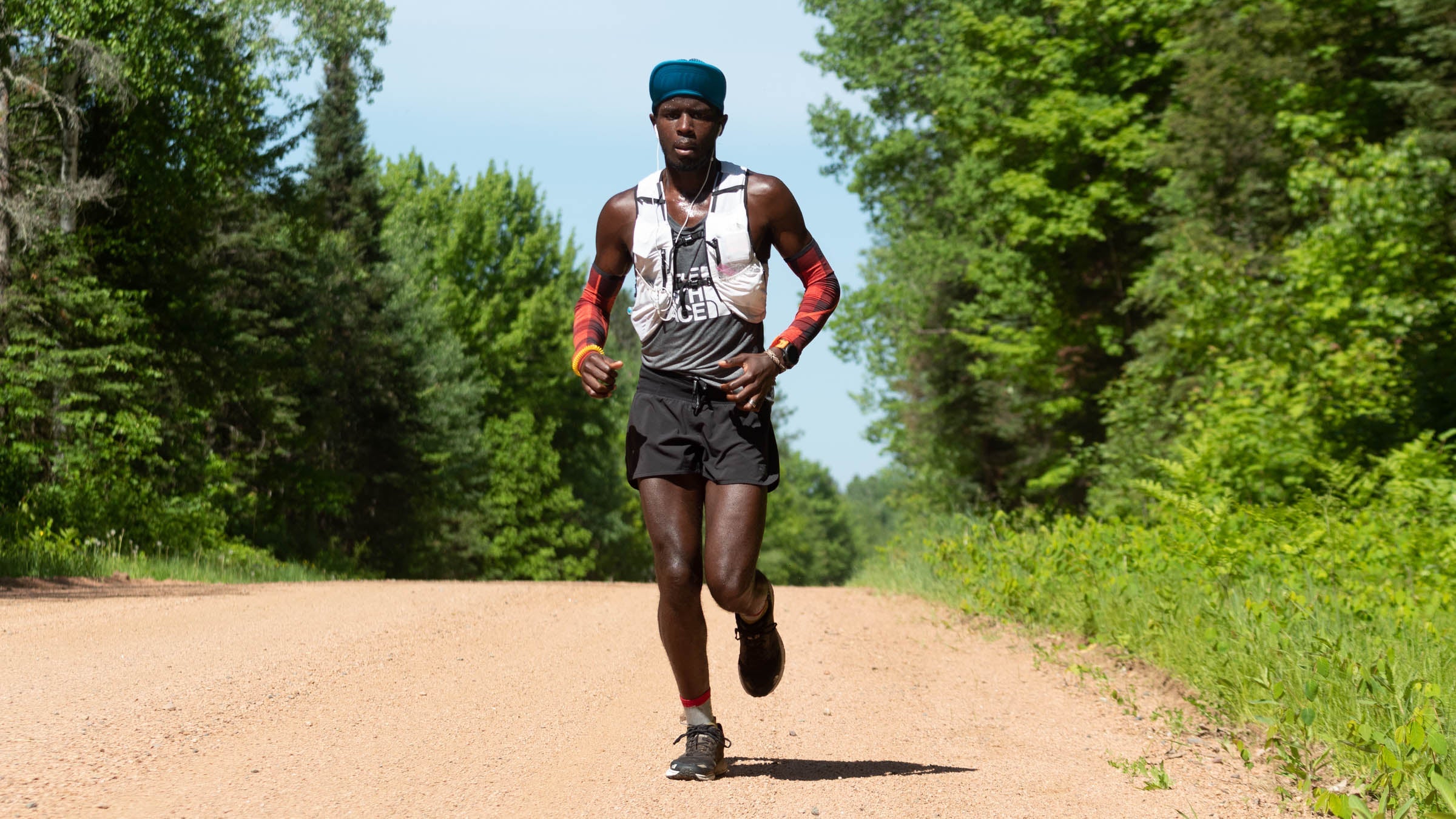On June 21, 30-year-old ultrarunner Coree Woltering finally stopped running after setting the Fastest Known Time (FKT) for the 1,147-mile Ice Age Trail that winds its way through the state of Wisconsin. Woltering completed the task in 21 days, 15 hours and 35 minutes. (The previous record was 22 days, 6 hours). The run doubled as a personal mission and a fundraising project—he raised money for the nonprofit Feeding America, and also for a trail restoration project for the Ice Age Trail.
Woltering ran the 400 and 800 meters in high school in Ottawa, Illinois, and at Greenville University, then turned his sights on becoming a professional triathlete. But after pacing a friend at the 2014 Leadville Trail 100, he became smitten with distance running. He ran the Quad Cities Marathon in 2:37 not long after, has since won a handful of 50Ks and placed 25th at the 2018 Western States 100 and has seen success at various distances.
With the global pandemic shutting down the 2020 racing season, Woltering had an idea. “I was just kind of bored,” he jokes, answering the question about why attempt the Ice Age Trail FKT. “Who decides to run 1,200-miles in one shot because they’re bored? I guess I do.”
“I also just felt like there needed to be a positive story right now,” adds The North Face-sponsored runner. “It was like, ‘Here’s this Person of Color doing this, and doing it in a conservative part of the country.’ That’s just what I felt like needed to happen.”
We recently chatted with Coree on subjects from mid-run cupcakes, to how non-elites can stay motivated during COVID-19, to running for something bigger.
PodiumRunner: How are you feeling, now that you’re a couple weeks out from completing the record?
Coree Woltering: The first week of recovery seemed like everything was gonna take forever. I’d wake up and feel like I had to get back on the trail — be full of fear and panic that I’d have to start running. Sleeping wasn’t fun. Now I’m taking 2-hour naps during the day, and sleeping 8 hours at night. During the record I slept 4 to 6 hours a night, but towards the end I just slept 20-minute periods. Those last few nights I didn’t sleep much at all.
PR: Can you talk a little about the interactions you had with people while out on the trail?
CW: The people of northern Wisconsin were awesome. I was wearing a SPOT tracker and people would find out where I’d be and drop off cupcakes, chili, lasagna… Multiple people opened up their homes to us, were cooking meals for us. So I’d have this homemade food in the middle of the night. It really restored my faith in humanity.
PR: Were you expecting such a warm welcome, and so much support, along the way?
CW: It was very surprising. With COVID going on, and the George Floyd incident that piqued a civil rights movement, I wasn’t sure what we should expect. But people were 100% supportive. It was shocking. I’m sad that it has to be shocking, but I’m glad that it was a great experience.
I know my experience has not been the same as everyone else’s. I’m happy I did have that experience so I can show it to people, and show that not everything is awful.

PR: We ran a story recently about diversity and inclusivity and the need for change in trail running. How do you feel about that topic?
CW: I would love to see more people of color, and more people from the LGTBQ+ community involved in trail running. I’m basically all for anybody that’s not been represented in a fair light. I’d love to see that.
I raced on Team Onyx for Eco-Challenge last year. We were the first all African-American team to race Eco-Challenge, and two of us were from the LGBTQ+ community.
When I was growing up I didn’t see people who looked like me racing on trails. Now that I’m getting some attention — I’m not creating drama just for attention — for me it’s more about inspiring children to do this, or even adults who maybe don’t know this is their goal. If you don’t know about it [trail running], how do you know it’s something you want to do?
PR: What do you say to people who maybe are intimidated to try something because they don’t see people who look like them doing that thing?
CW: That’s a very hard question for me. I was adopted into a white family. I don’t want to say things were easy, but if I saw something I wanted to do, I just went and did it. My dad was always saying, “You do you.” I’m sure I was a very difficult child. I’m extremely strong-willed. I’m sure I just went after it. I didn’t think about race or whatever. That’s not everybody’s story from the Midwest, or the South, or wherever. But for me, it was like, “I’m going after it.” And in my adult life, it’s, “I’m gonna do what I’m gonna do.”
PR: Have you gotten a lot of attention since breaking the record?
CW: It’s changed things in terms of social media quite a bit. I don’t post things just to get Instagram likes. If I’m gonna post something, I’m posting it from my true self. During this FKT attempt, I went from 4,500 followers to almost 13,000 now, and it blows my mind. In my head I’m still just some kid from Ottawa, Illinois, who went out to run some trails, and I don’t know how to explain it. It blows my mind. I’m just doing what I’m doing.
PR: What was your first ultramarathon, and what do you wish you knew then that you know now?
CW: I did the Malibu Canyon 50K in December of 2014, and finished 3rd. My biggest advice for those starting out longer races is to figure out what food works for you and use it. Whether it’s a gel or a solid food or whatever. Just figure out the nutrition, and the rest of it falls into place.
PR: What do you say to people who are at home and maybe having a hard time staying motivated to run during COVID?
CW: I think races will come back; we just don’t know when that will be. If you can build your fitness now you will be ready to race when it comes back. Some people are motivated by medals, some by virtual races — there are some great ones people can support. If you love running it shouldn’t be that hard to get out the door. I have stretches where I won’t run for 3, 4, 5 days at a time. I’m not super motivated all the time, but then it’s like, “Oh there is this goal, so I’m gonna do it.” It’s okay to not run everyday and not stick to the training plan. Just enjoy your running.
PR: How did you stay motivated during your FKT attempt?
CW: I just gutted it out. There was a lot of pain involved, a lot of suffering. I was fine with it. I was also fundraising for Feeding America — I don’t believe any child should go to bed hungry. My big thing was that there are people that are not choosing to go to bed hungry. I was putting myself in a position of discomfort and could end it anytime. I didn’t want to end it. Hopefully, I can help end others’ discomfort. I’ve raised about $30,000 now. Before that, I did a “Big Run for Small Business” by running every street of Ottawa and raised $13,000 in 204 miles. I took the money and bought gift certificates from small businesses and gave 60% to frontline healthcare workers, and the other 40% to other small businesses.
Things are difficult right now. Things are hard. People have been super gracious with donations. I just keep on moving forward and run for something bigger than myself.
I just want people to be treated like they should be treated. It seems like a pretty basic thing.


